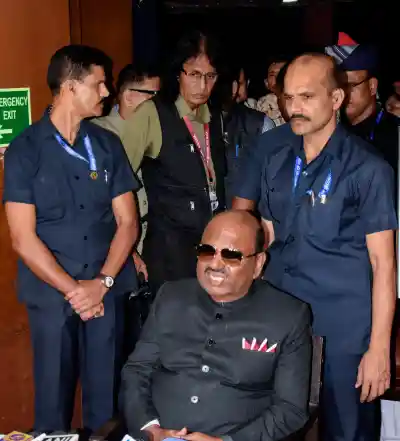

Mumbai, March 5: Wedding festivities for cricketer Arjun Tendulkar and businesswoman Saaniya Chandhok began in grand style in Mumbai on Thursday, drawing a guest list from India's cricketing, business, and film industries.
The son of cricket legend Sachin Tendulkar and Anjali Tendulkar is tying the knot with Chandhok, the granddaughter of noted industrialist Ravi Ghai.
The ceremony on March 5 has become one of the most talked-about celebrity weddings of the year, with several prominent figures expected to attend the celebrations.
Among the early arrivals were Bollywood stars Abhishek Bachchan and Aishwarya Rai Bachchan, who reached the venue together and briefly posed for photographers gathered outside.
For the occasion, Aishwarya chose an elegant blue anarkali ensemble, while Abhishek complemented her look with a black kurta paired with white trousers. The couple smiled and acknowledged the cameras before heading inside to join the celebrations.
Several other celebrities from the entertainment industry were also spotted arriving at the venue.
Filmmaker Vidhu Vinod Chopra attended the ceremony with his family, while music composer Shankar Mahadevan arrived with his wife in matching coloured outfits.
Actor Farhan Akhtar also arrived at the wedding, wearing a ivory kurta-jacket set.
Actor Aarti Singh attended the event with her husband, and filmmaker Ashutosh Gowariker was among the other prominent guests present at the wedding.
The wedding is expected to bring together several leading names from cricket, politics, business, and Bollywood.
On March 3, the family came together for a pre-wedding ceremony with high-profile guests and cricket icons like Zaheer Khan, Harbhajan Singh, and Ravi Shastri bringing in more glamour to the evening.
Earlier in February, Sachin Tendulkar and Anjali Tendulkar met Maharashtra Deputy Chief Minister Eknath Shinde at his official residence, Nandanvan, in Mumbai and extended an invitation for the wedding ceremony of his son.
Sachin Tendulkar has also extended invitations to President Droupadi Murmu, Prime Minister Narendra Modi, Union Home Minister Amit Shah and Leader of the Opposition in the Lok Sabha Rahul Gandhi for the wedding celebrations.
Arjun and Saaniya got engaged in August last year. (ANI)